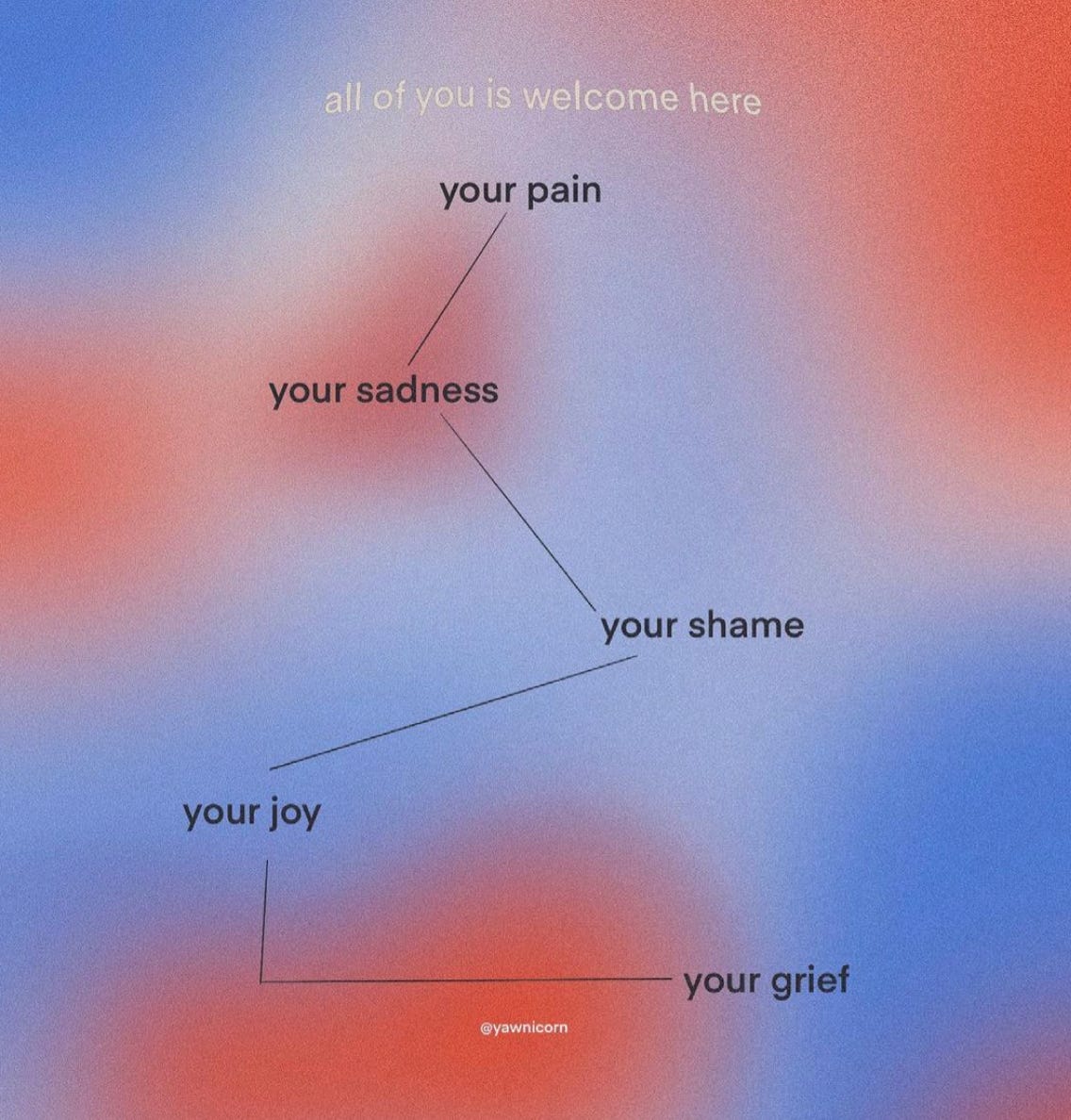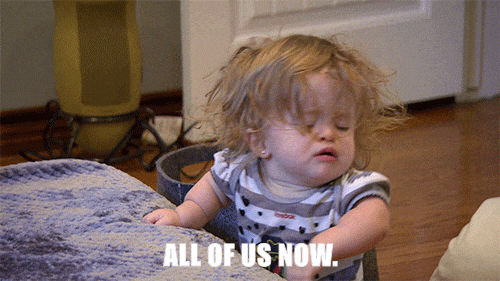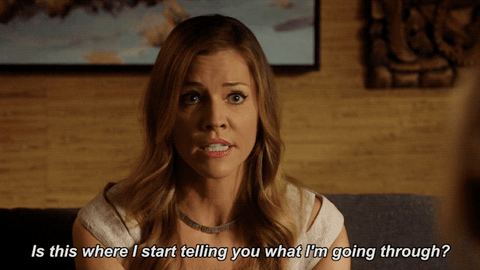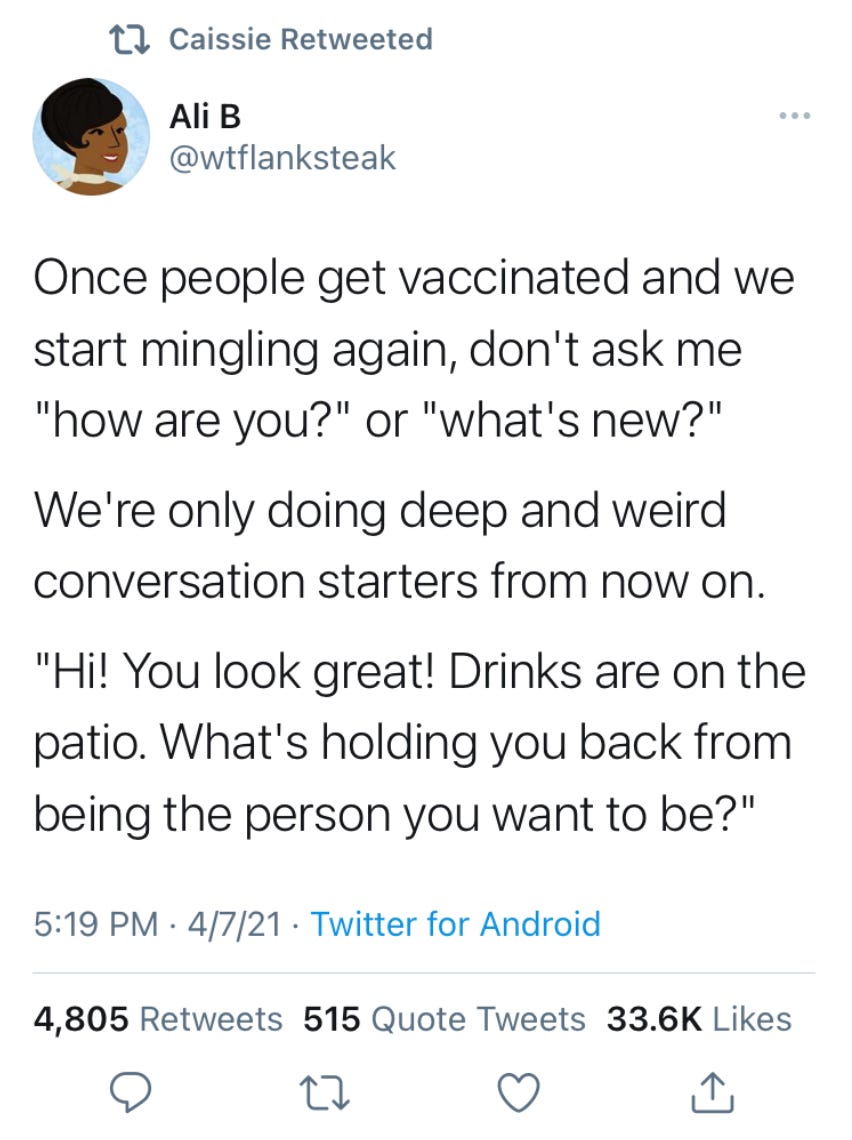Chronically Cheerful #4: You're a human being, not a human doing.
On reclaiming one's worth, making the most of therapy, and social anxiety.
Imagine that someone asks an all too familiar question: “How are you?” What’s your go to response?
If you said, “Burned out,” you’re not alone.
Hard work can lead to amazing payoffs: material success, a greater purpose, major innovations. But there’s a difference between working hard and living to work. Especially in pandemic times.
Hustle culture is dominating society right now, a phenomenon that glorifies ambition not as a means to an end, but as a lifestyle centered on “performative workaholism.” Because of this, we tend to view being busy as a measure of moral superiority and success -- and we assume that being exhausted means we’re doing something right.
But the research only shows otherwise. Constant hustle — distinct from good ol’ hard work! — leads directly to burnout, one of the biggest health crises of our generation. When Stanford researchers looked into how workplace stress affects health costs and mortality in the US, they found that it led to spending of nearly $190 billion and nearly 120,000 deaths each year. And it’s been proven that rest and play actually makes us more productive, creative and fulfilled.
So how do we begin to reclaim rest and redefine productivity on our own terms?
Here are five steps to detach your productivity from your worth:
Remember you’re a human being, not a human doing. Society (ahem, capitalism!) tells us our value as a person is our ability to work. Based on this definition, how would we value the elderly? What about children? Or the disabled? Do you value these humans any less because of their inability to “productively” contribute to society? Next time you start questioning your worth because you didn’t accomplish everything you wanted to, remember that your value is inherent: you don’t have to earn it.
Focus on who you are, not what you do. Basing your entire self-worth on your achievements is like building a house on an unsteady foundation. Instead of relying on unpredictable, unreliable external factors to determine your worth, try focusing on who you are at your core. To help you cultivate this, try a weekly practice of reflecting on your full identity, including roles in individual and collective circles, personal qualities, interests and dreams. These aspects of yourself remain unchanged, no matter what you accomplish.
Reframe rest as productive. We can’t afford to slow down only when we’re tired or as a reward for accomplishing something (see above stats on burnout). You are not lazy for taking the time you need to recharge and restore yourself — you’re proactively building up the strength to show up as your best self. In fact, neuroscience is finding that when we are idle, in leisure, our brains are most active. Overwork, in other words, kills your creativity.
Give yourself some grace. If you’ve been struggling to focus or be as productive as normal during this pandemic, know this is NORMAL. When facing a stressful situation, the brain kicks into fight/flight mode to ward off potential threats. Unfortunately, under prolonged, chronic stress or uncertainty, this biological response lingers because the “threat” remains — making us much less effective at activities that require focus and concentration. If you have guilt about not performing or producing at your best, give yourself permission to let that go.
Focus on moments, not just milestones. Have you ever experienced that burst of accomplishment after meeting a goal...only to be followed by a dragging sense of emptiness when you realize now it’s just onto the next thing? When you measure life by milestones, you might feel like life happiness is just always out of reach and you’re always falling just short of “getting there.” This mindset can make you lose sight of the practices, people and rituals that can actually imbue life with meaning. A mindfulness practice can help you reclaim joy in the journey, slow down and stave off that feeling like you’re just another cog in the machine.
For the week ahead, I challenge you to let go of productivity as a means of measuring your self-worth. No matter what gets checked off your to-do list, reaffirm to yourself that you’re valuable exactly as and where you are.
Yours in healing,
Carolyn
Q&A: Question from the CC Community
Q: How can you make the most out of a therapy session?
Some weeks, it’s clear what will be on the agenda during therapy. A major life event; a big win; a new job. Other times…your day-to-day is mostly the same (hello, COVID!) and you may be unsure of what to discuss. Here are some ideas to help you shake off any anticipatory anxiety before your next therapy appointment.
Keep a running list in your notes app of situations, ideas or experiences that make you think, I want another take on this! You can also try this approach with journaling, scanning back over what you’ve written before a session.
You can always delve deeper into evergreen topics like self-image, relationships, or your past if nothing specific is especially bothersome between sessions.
Recognize you may not feel like you have the bandwidth to deep-dive into difficult emotions during stressful COVID times. That’s ok. You can bring this up with your therapist, too!
Therapy is a space for all thoughts and feelings, even (especially) the ones we feel ashamed or judgmental toward. A lot of us are struggling with grief and guilt during the pandemic, but haven’t been able to give those emotions a voice. Therapy can be that safe space.
P.S. If anyone needs another reason why therapy is great, this book is a gem.
You’re Not Alone in This
I am so excited that people are getting vaccinated. Finally! It’s happening!
But that means…more socializing.
Don’t get me wrong. I am incredibly excited to start seeing people again besides my immediate family (who were my #quaranteam) and the two or three friends that I felt comfortable seeing outside, with masks, at a distance. Your girl’s social circle was SMALL.
I have a deep, dark fear of completely forgetting how to make small talk. These days, my husband and I sometimes communicate purely in noises: “Beep, bop? Beep, Boop.” (“Is dinner ready? Yep.”) We’ve reverted to baby babble.
This article by Rachel Miller of Vice, “How to Make Small Talk After We've Been Through... a Pandemic” does a great job of validating my feelings. She writes:
If you’ve been inside for the past year with, say, only a housemate or a pet to talk to, well… it makes sense that you’d be a little out of shape, chitchat-wise. And after a year when the answers to “How are you?” and “What’s new?” have been some form of a tired shrug, at best, a lot of folks are feeling very, What the hell do we even talk about?! The weather? Getting vaccinated?? The horrors of the past year and our unresolved pandemic beeves??? It all feels wrong somehow!
She gives good tips that I plan to try out, like asking open-ended questions, trying not to force positivity, and trusting that other people are probably feeling anxious, too.
So if, like me, you’re already feeling shaky as you schedule some outdoor meetups, know you’re not alone.
Hold Onto This









